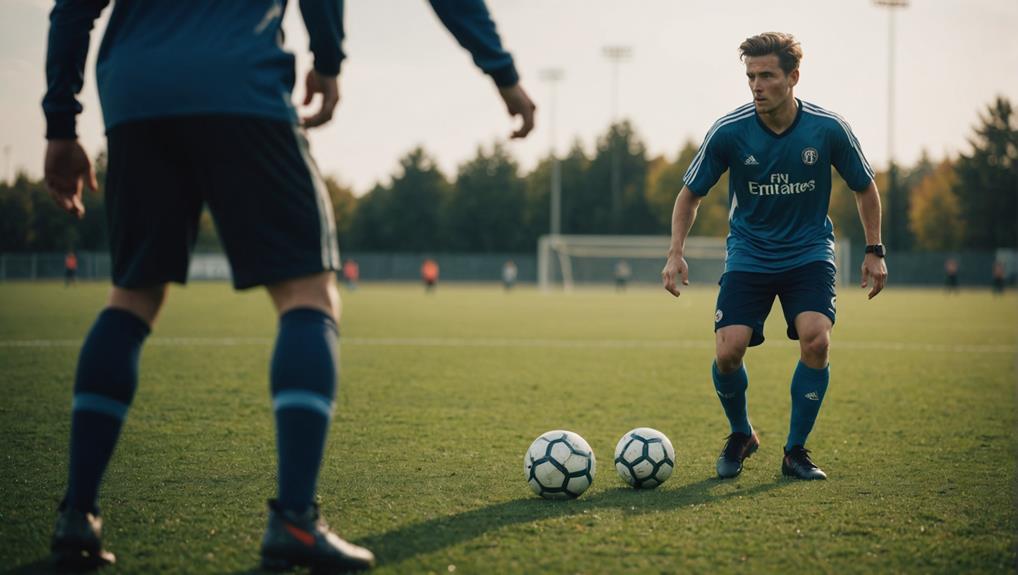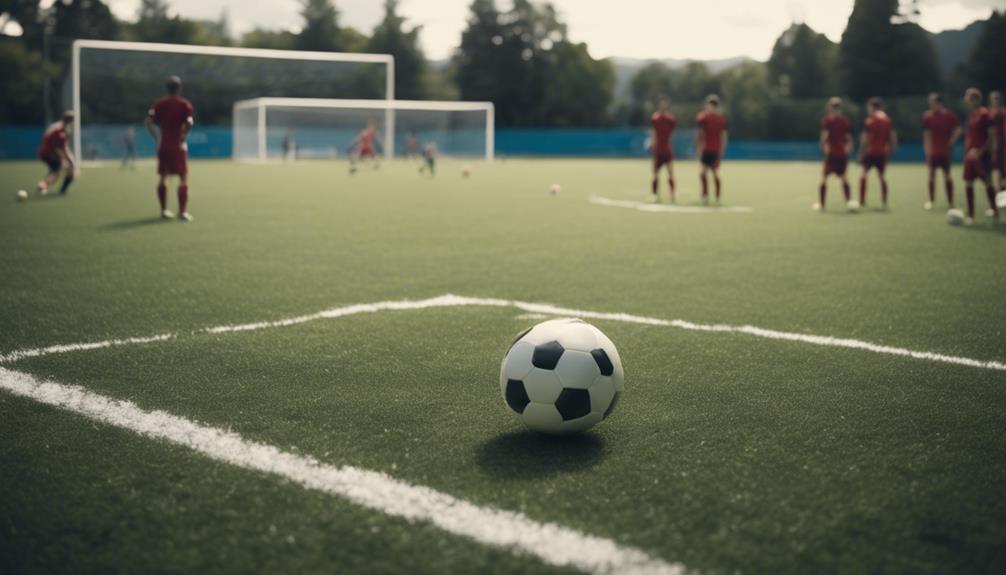
How to Go Pro in Soccer: Tips and Advice
July 13, 2024To go pro in soccer, focus on mastering technical skills like ball control and passing. Practice daily to improve consistently and understand different positions and strategies. Set clear goals, visualize success, and prioritize nutrition and recovery. Seek feedback, analyze gameplay, and communicate effectively with coaches. These tips are fundamental for your journey to becoming a professional soccer player.
Developing Technical Skills
Mastering technical skills in soccer requires dedicated practice and a focus on key techniques such as ball control, passing, dribbling, and shooting. To improve your ball control, focus on using both feet effectively.
Professional soccer players are known for their exceptional dribbling skills, which can be honed through drills that emphasize close control and quick changes of direction. Utilize cones to practice dribbling in tight spaces and develop your agility.
Additionally, work on your shooting technique by practicing various types of shots, such as volleys and strikes with both power and precision. Remember, becoming a proficient player requires mastering these technical skills to a high standard.
Seek feedback from experienced coaches and teammates to refine your techniques continuously. By prioritizing the enhancement of your ball control, dribbling skills, and shooting accuracy, you can take significant steps towards playing soccer at a professional level.
Consistent Practice and Dedication
Consistently practicing and staying dedicated are fundamental pillars for achieving success in professional soccer. In the domain of professional soccer, daily practice isn't just a routine but a necessity for skill development and growth. The commitment to continuous improvement through dedicated training sessions is what sets professional players apart.
To excel in professional soccer, one must embrace the grind of regular practice to enhance technical abilities, decision-making skills, and physical conditioning. Dedication to honing these aspects is vital for competing at the highest levels of the sport.
Top players emphasize the importance of consistent effort and focused practice to refine their abilities continually. Success in soccer isn't just about natural talent; it's about the relentless pursuit of improvement through purposeful training. Remember, in the world of professional soccer, dedication to practice is the key that opens the door to success.
Understanding Positions and Tactics

Understanding the various soccer positions and tactical strategies is essential for excelling in the sport and contributing effectively to your team's success.
In soccer, different positions like striker, midfielder, and defender come with specific skills and responsibilities. For instance, strikers need to focus on scoring goals, while midfielders are important for controlling the game's tempo. Defenders must excel at stopping opposing attacks and maintaining a solid defensive line.
Having tactical awareness is key as it helps you understand when to attack, defend, or support teammates based on your position on the field. Recognizing team structure and your role within it allows you to execute strategies like pressing high up the field or organizing the defense effectively.
Adapting to various roles and mastering tactical nuances not only enhances your performance but also contributes significantly to your team's overall success in soccer.
Setting Goals and Mental Preparation
To excel in soccer and work towards going pro, it's essential to set clear goals and prioritize mental preparation. Setting specific and measurable goals in soccer is pivotal as it provides direction, motivation, and a way to track your progress towards achieving your dreams.
By writing down your goals, you can hold yourself accountable, maintain motivation, and work diligently towards your aspirations of becoming a professional player.
Mental preparation in soccer is equally important. This involves visualizing success, focusing on the task at hand, managing stress effectively, and building confidence to optimize your performance on the field.
Learning from mistakes is also a critical aspect of growth in soccer. Understanding and analyzing your mistakes help in skill improvement, decision-making, problem-solving, and recognizing weaknesses that need attention.
Committing to Nutrition and Injury Prevention

You must prioritize proper nutrition to fuel your body for peak performance on the soccer field.
Hydration and balanced meals are key components in preventing injuries and maintaining your physical condition.
Remember to follow injury prevention strategies and prioritize rest and recovery to keep yourself in top shape.
Proper Nutrition Importance
Committing to proper nutrition and injury prevention is essential for soccer players aiming to excel in their sport. Nutrition plays a significant role in maintaining peak energy levels, supporting muscle recovery, and preventing injuries on the field.
A diet that includes a balance of carbohydrates, proteins, vitamins, and minerals is essential for fueling your body and meeting the physical demands of soccer. Additionally, staying hydrated is key not only for injury prevention but also for regulating body temperature and enhancing overall athletic performance during matches.
Injury Prevention Strategies
Prioritizing proper warm-up routines and incorporating a balanced diet rich in essential nutrients are key strategies for preventing injuries in soccer. Before each training session or match, make sure to engage in dynamic stretches and movements to prepare your muscles for the demands of the game.
A balanced diet consisting of carbohydrates for energy, protein for muscle repair, and proper hydration is essential for supporting muscle recovery and overall injury prevention.
Additionally, wearing the right equipment such as appropriate footwear and protective gear can greatly reduce the risk of common soccer-related injuries. Investing in quality gear tailored to your position and playing style is vital for staying safe on the field.
Remember to also incorporate rest and recovery days into your training schedule to prevent overuse injuries and allow your body to heal and recuperate.
Recovery and Rest Essentials
Recovery and rest are essential components of a successful soccer player's routine, important for maintaining peak performance and preventing injuries.
Proper nutrition and hydration play a significant role in muscle recovery and overall performance on the field. Hydrating adequately and consuming nutritious meals can aid in replenishing energy stores and promoting muscle repair post-training or games.
Equally important is ensuring you get sufficient rest and quality sleep. Adequate sleep is paramount for muscle recovery, injury prevention, and overall well-being.
Implementing injury prevention strategies such as warm-up routines, stretching exercises, and using proper equipment is essential for staying healthy in soccer.
Balancing intense training with proper rest periods is key to avoiding burnout and maximizing your long-term athletic potential.
Continuous Improvement and Feedback
To excel in soccer, actively seek feedback from coaches and teammates to pinpoint areas for improvement.
Engage in skill enhancement techniques and maintain open communication with your coach for personalized guidance.
Embrace the process of continuous improvement as a fundamental aspect of your journey towards achieving a professional soccer career.
Skill Enhancement Techniques
Consistently practicing and seeking feedback are key strategies for continuously enhancing your soccer skills. To improve your dribbling, first touch, skills, and techniques, focus on individual training sessions where you can hone specific aspects of your game.
Utilize training aids such as cones, walls, and rebounders to work on dribbling drills, passing accuracy, and shooting precision. Incorporate game-like scenarios into your training to simulate real match situations and improve decision-making under pressure.
Seek feedback from coaches and teammates to identify areas needing improvement. Adjust your training regimen based on this feedback to target weak areas and further develop your strengths.
Additionally, watch professional matches critically to analyze and learn new strategies, movements, and playing styles. Regularly review videos of your own gameplay to assess field positioning, decision-making, and overall performance.
Coach-Player Communication
Maintaining open and constructive communication with your coach is essential for continuously improving your performance and receiving valuable feedback in soccer.
To enhance your coach-player communication and foster growth in the sport, consider the following:
- Seek regular feedback from your coach to identify areas for improvement and track your progress effectively.
- Clarify tactics, strategies, and expectations with your coach to deepen your understanding of the game and enhance your performance on the field.
- Engage in open dialogue with your coach to address any concerns, set achievable goals, and work together towards success.
- Actively listen to your coach's advice, implement suggested changes, and demonstrate a proactive attitude towards learning and development.
Conclusion
To sum up, becoming a professional soccer player requires relentless effort and dedication. Practice makes perfect, so keep honing your skills, understanding the game, and setting goals.
Stay committed to proper nutrition and injury prevention to stay at the top of your game. Remember, the key to success is continuous improvement and seeking feedback.
Keep pushing yourself to reach new heights on the field and never give up on your dreams.


